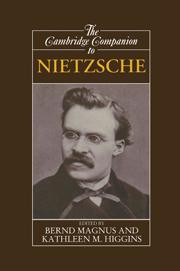1 - Nietzsche's works and their themes
from Part I - Introduction to Nietzsche's works
Published online by Cambridge University Press: 28 May 2006
Summary
Interpretation of Nietzsche's thought is a complex enterprise. Because of his avoidance of any conventional philosophical system and his many experiments with styles and genres, Nietzsche's writings seem to demand a sense of active reading. The “Nietzsche” that emerges from scholarly discussion typically depends on the interests of the interpreter and especially often those of the interpreter's discipline. Themes which are taken to be most central to Nietzsche's philosophy often depend on which works are regarded as most important or most accessible; but the relative importance which attaches to each of Nietzsche's works is by no means obvious. Indeed, Nietzsche scholarship has experienced fads with regard to given points of interest. As we will consider below, Thus Spoke Zaiathustia's celebrity outside of Germany declined after the Nazis invoked it for propagandistic purposes, while Nietzsche's early essay “On Truth and Lies in a Nonmoral Sense” has assumed new importance in recent literary-critical discussion, in part because it suggests that all language is metaphoric.
- Type
- Chapter
- Information
- The Cambridge Companion to Nietzsche , pp. 21 - 68Publisher: Cambridge University PressPrint publication year: 1996
- 3
- Cited by

